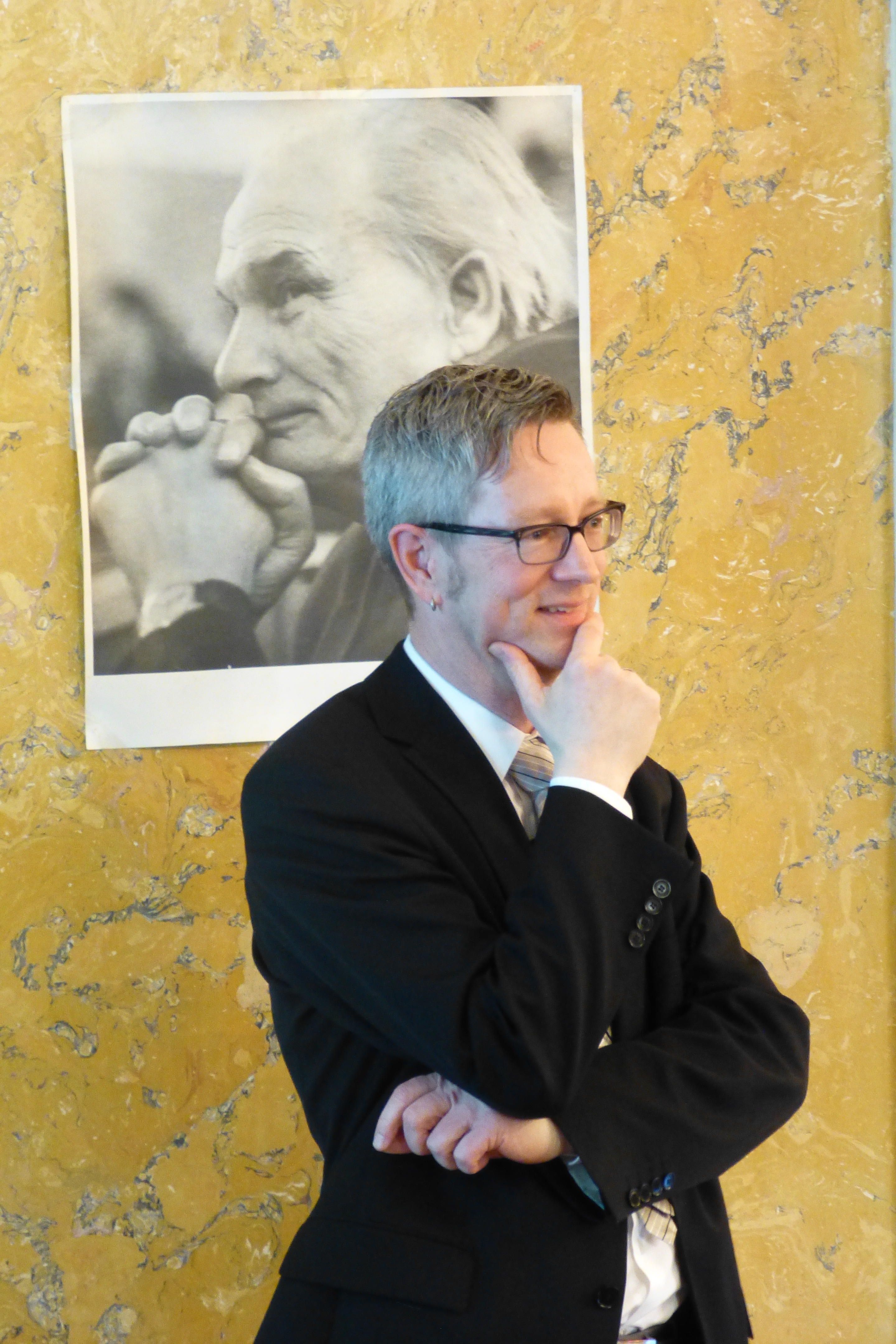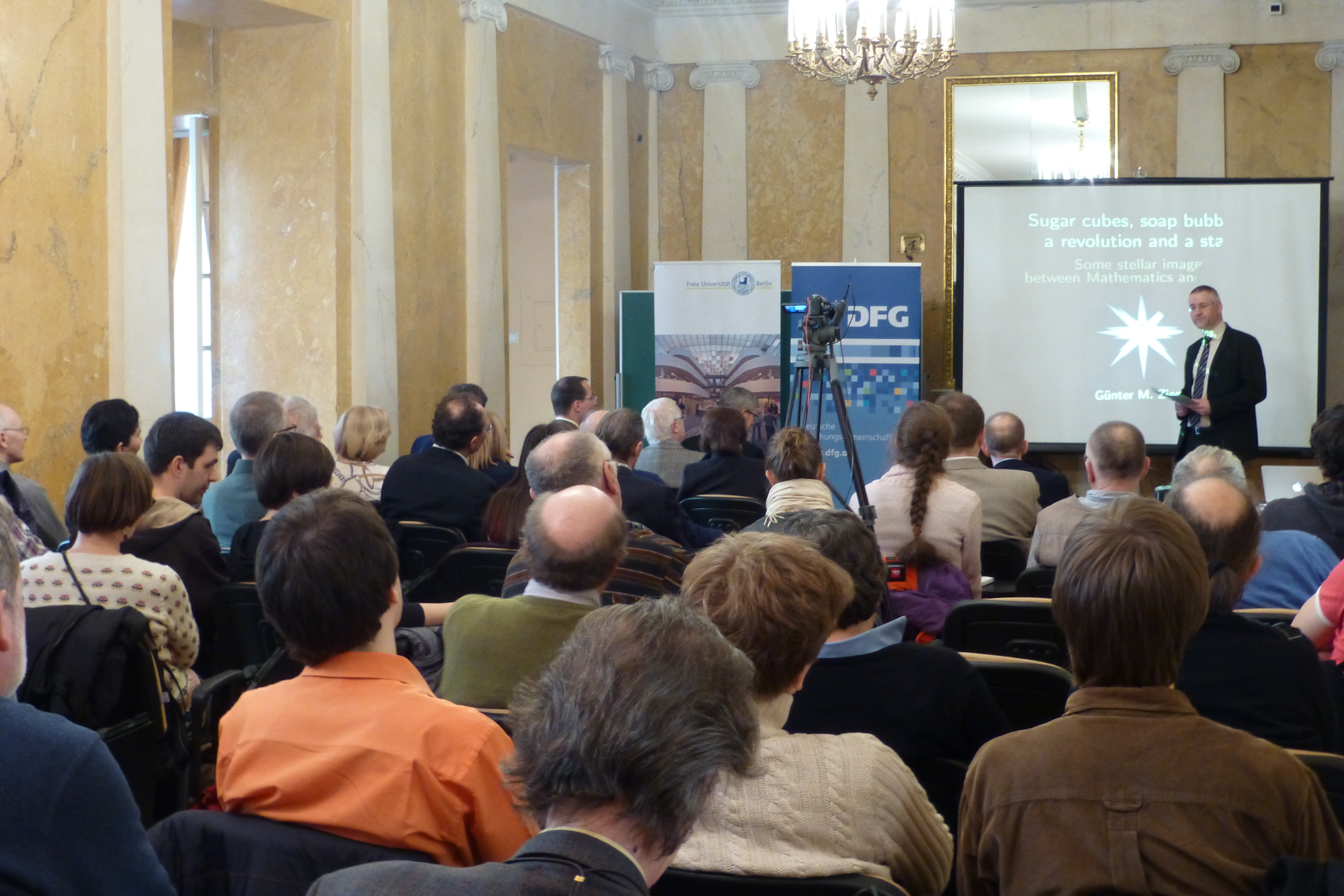Sugar cubes and soap bubbles: Günter M. Ziegler delivers DFG Leibniz Lecture in St. Petersburg
(28.03.14) At the end of March 2014, the Deutsche Forschungsgemeinschaft (DFG, German Research Foundation) and the Free University of Berlin organised the first Leibniz Lecture in St. Petersburg through the German House for Research and Innovation (DWIH) in Moscow. Having already given a lecture in Moscow last year, this time Berlin-based mathematician Günter M. Ziegler spoke at the famous Steklov Institute in St. Petersburg.

Professor Günter Ziegler (Free University of Berlin) at the Steklov Institute of Mathematics
An audience of over 70 people from St. Petersburg's universities and research institutes attended the evening lecture on 27 March at the invitation of the DFG and the Free University of Berlin. They were welcomed by the directors of the St. Petersburg branch of the Steklov Institute of Mathematics, part of the Russian Academy of Sciences, who made their magnificent marble hall available for the event. German Consul General Heike Peitsch welcomed the audience on behalf of the German representation in St. Petersburg. She referred to the special role played by science and the humanities as a builder of bridges between Germany and Russia.
The DFG's representative in Russia, Jörn Achterberg, explained in his introduction that the DFG organises the Leibniz lecture series, delivered by the winners of Germany's most important research prize, at worldwide locations where it has its own foreign representations. The lectures present the latest topics of top-level research in Germany and opportunities for bilateral cooperation. The idea of the lecture series is for Leibniz prizewinners to act as ambassadors for German research. A study of the publication output of prize recipients by Lucy Amez (Brussels) illustrates the high potential for international cooperation.

Jörn Achterberg (DFG Moscow) at the opening of the first Leibniz Lecture in St. Petersburg
Ziegler travelled to Russia's 'northern capital' for an international mathematics conference at the Euler Institute, which served as the framework for the Leibniz Lecture. Günter M. Ziegler, who has held a MATHEON professorship at the Free University of Berlin since 2011, is an internationally distinguished researcher in discrete geometry. His lecture on this occasion, which held his audience spellbound, was entitled "Sugar cubes, soap bubbles, a revolution and a star: Some stellar images between Mathematics and Physics". Prof. Ziegler demonstrated once again that he is not only an outstanding researcher (having received the Leibniz Prize in 2001 and an ERC Advanced Grant in 2010), but also has the ability to present scientific findings in an accessible way to an audience (he also won the Communicator Award in 2008). As the President of the German Mathematical Society (DMV), he initiated and helped organise the highly successful Year of Mathematics in 2008.
After the Leibniz Lecture, guests were invited to a small reception hosted by the Free University of Berlin and its representative Tobias Stüdemann. As well as being the alma mater of the evening's speaker, the university also has long-established ties with St. Petersburg. In 1968 it became the first western university to enter into a cooperation agreement with what was then Leningrad State University. As part of Germany's Excellence Initiative, it delivered an outstanding concept for the internationalisation of the institution. Through a worldwide network of seven liaison offices, including one in Moscow, the Center for International Cooperation supports international research cooperations and promotes links with leading scientific institutions – such as St. Petersburg State University – through Primary Partnerships.
A collaboration with the Chebyshev Laboratory, which the German delegation was able to visit the following day, is one example of a collaboration that could provide fresh opportunities for cooperation between the universities. The Chebyshev Laboratory was established in December 2010 by Stanislav Smirnov from St. Petersburg State University with the help of a US$5million mega-grant from the Russian government. Smirnov, a distinguished mathematician (Geneva / St. Petersburg), who won the Fields Medal in 2010, welcomed both Günter Ziegler (FU Berlin) and Alexander Bobenko (TU Berlin), the spokesperson for Collaborative Research Centre TRR 109, Discretization in Geometry and Dynamics. Both men are involved in the Berlin Mathematical School (BMS), a joint initiative of the mathematics departments at FU Berlin, the Humboldt University of Berlin and TU Berlin. During the first phase of the Excellence Initiative in 2006, funding was successfully acquired to establish a graduate school that brought together the wide range of mathematical expertise in the German capital. Mathematics has a long-standing tradition in Russia, and in particular St. Petersburg, making them preferred international partners.